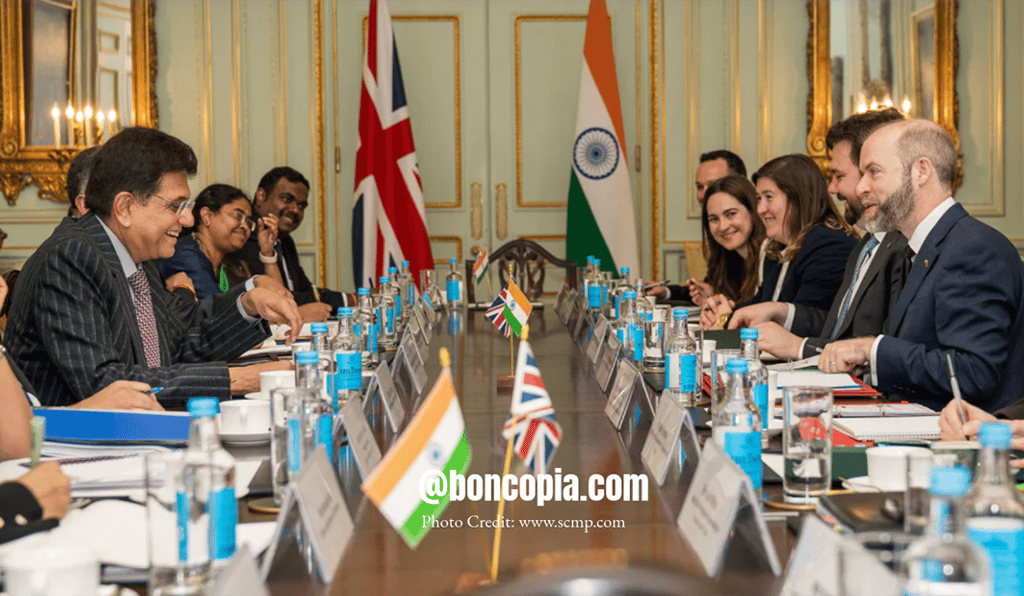India’s Big Trade Win: Why the UK Deal Matters More Than a US Pact
5/8/20254 min read


India’s Big Trade Win: Why the UK Deal Matters More Than a US Pact
Published on Boncopia.com | May 6, 2025
A Trade Deal That Shook the World
On May 6, 2025, India and Britain sealed a “landmark” free trade agreement, a move the UK government hailed as a major step forward. This deal, which promises to boost bilateral trade by 25.5 billion pounds ($34.13 billion) annually by 2040, comes just as U.S. President Donald Trump ramps up tariffs to historic levels. While the U.S. had been in talks with India to avoid these punishing tariffs, India’s pivot to the UK signals a shift in global trade dynamics. Let’s dive into what this deal means, why it matters, and how it could reshape the economic landscape.
The UK-India Pact: What’s in It?
According to a Reuters report from May 6, 2025, the UK-India trade agreement focuses on lowering and removing tariffs, particularly in key sectors like whisky, cars, and food. This deal was spurred by tariff turmoil from the U.S., which pushed both nations to hasten their negotiations. The agreement includes a social security deal—celebrated by India as a “huge win” but criticized by Britain’s Conservative opposition as a “giveaway.” It’s part of a broader package that also covers trade and investment, though it notably excludes Britain’s Carbon Border Adjustment Mechanism (CBAM), a point of contention for India.
The numbers are impressive: the deal is expected to grow trade between the world’s fifth and sixth-largest economies by $34.13 billion a year by 2040. For context, India’s exports to the UK were worth $12.8 billion in 2023, per the Indian Ministry of Commerce, so this pact could nearly triple that figure over time. It’s a big win for both nations, especially as global trade faces uncertainty.
Trump’s Tariffs: A Missed Opportunity for the US
For weeks, Trump has teased an imminent trade deal with a major partner, with India seen as a frontrunner. A Reuters article from April 29, 2025, noted that India was prepared to “future-proof” a deal with the U.S. by offering forward most-favoured nation status, ensuring no other trade partner would get better terms. This was a rare concession from India, aimed at avoiding Trump’s proposed 26% reciprocal tariffs. Yet, no deal materialized.
Instead, Trump doubled down on tariffs, including a 10% levy on all Chinese goods starting February 4, 2025, and threatened tariffs on Canada, Mexico, and others, according to a J.P. Morgan Research update. A January 2024 study by David Autor, cited by the Tax Foundation, found that Trump’s earlier 2018-2019 tariffs, worth $380 billion, failed to boost U.S. employment in protected sectors while foreign retaliation harmed agriculture. These new tariffs, amounting to a $1,300 tax increase per U.S. household in 2025, have raised fears of a global recession, with markets tumbling, per J.P. Morgan.
Why India Chose the UK Over the US
India’s decision to finalize a deal with the UK instead of the U.S. isn’t surprising when you dig into the context. Trump’s aggressive tariff strategy has created uncertainty, while the UK offered a more stable partner. Ajay Srivastava of the Global Trade Research Initiative told Reuters that India was keen to avoid Trump’s tariffs, but the lack of progress in U.S. negotiations likely pushed India to prioritize the UK deal. Additionally, the UK-India pact aligns with India’s broader strategy to diversify trade partners amid global tensions.
The U.S. market remains critical—India exported $83.5 billion in goods to the U.S. in 2023, per the U.S. Trade Representative—but Trump’s policies have strained relations. A March 5, 2025, J.P. Morgan report noted a one-month reprieve for USMCA countries (until April 2), sparing Canada and Mexico from immediate tariffs, but India has no such buffer. By securing a deal with the UK, India hedges against U.S. unpredictability while strengthening ties with a key ally.
What This Means for Global Trade
The UK-India deal could set a precedent for other nations navigating Trump’s tariff threats. As the U.S. raises import taxes, countries like India are looking elsewhere for trade stability. This shift comes at a time when global trust in the U.S. is waning—a 2024 Pew Research Center report found favorable views of the U.S. at historic lows, with only 54% of Australians and 67% of Japanese holding positive opinions. Meanwhile, China’s Belt and Road Initiative continues to expand, investing $1 trillion globally since 2013, per the Council on Foreign Relations, filling gaps left by a retreating U.S.
For American businesses, the absence of a U.S.-India deal means higher costs and lost opportunities. India’s growing market—its GDP hit $3.9 trillion in 2024, per the IMF—offers immense potential, but U.S. firms may now face stiffer competition from British counterparts. On the flip side, the UK-India deal could pressure the U.S. to rethink its tariff strategy, as the prospect of losing trade partners grows.
A Wake-Up Call for the US?
The UK-India trade pact is a reminder that the global economy doesn’t wait for the U.S. to get its house in order. While Trump’s tariffs aim to protect American interests, they risk isolating the U.S. at a time when cooperation is crucial. India’s pivot to the UK shows that nations are adapting to a new trade reality—one where the U.S. isn’t the only game in town. As financial markets react to these developments, the question remains: Can the U.S. afford to keep raising tariffs while its allies forge ahead?
Let’s Discuss
Do you think the U.S. missed a critical opportunity by not securing a trade deal with India?
How concerned are you about the impact of Trump’s tariffs on the global economy—and your wallet?
Should the U.S. rethink its trade strategy to rebuild trust with allies like India?
What can the U.S. learn from the UK-India deal to stay competitive in global trade?
We’d love to hear your thoughts in the comments below!
Word Count: 873
hello@boncopia.com
+13286036419
© 2025. All rights reserved.